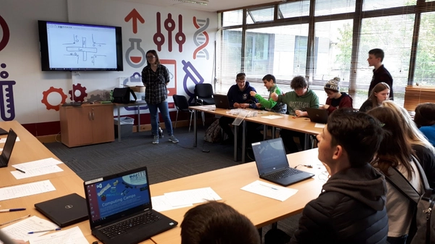CSinc
The computer science team at Technological University in Dublin (TU) run a nationwide CPD and school workshop initiative called CSinc (Computer Science Inclusive).

Students taking part in a CSinc workshop
The goals as a department are to to introduce coding basics into schools using the micro:bit, while their research focuses on teacher and student confidence or self-efficacy in computer science. They aim to understand what causes a lack of confidence and what can be done to mitigate this, changing perceptions of students towards computer science for the better.
Curriculum context
A new senior secondary subject (A-Level equivalent) Leaving Cert Computer Science (LCCS) is undergoing a national roll-out from 2020-2022. This course enables young people to complete secondary education with a qualification in computer science, complementing the existing lower secondary short course in coding which is currently available. The CSinc team offer training and support for teachers delivering the new course through the teacher professional development body PDST.
Teacher CPD
The CSinc team offer introductory and advanced courses for teachers wishing to develop their practice by using micro:bit with other tools and platforms. Their main focus is on self-efficacy: how comfortable teachers are with teaching with the device.
Their courses use Python as the main programming language and include practical activities using the micro:bit's radio function and accelerometer.
In 2018/19, their free in-person workshops were attended by up to 50 - 80 teachers per session. The network effect of the workshops has meant that clusters of local teachers have continued to connect with each other to share ideas afterwards as they begin to implement the tools and training in their practice.
In 2020 the team pivoted to online CPD sessions using the micro:bit classroom tool.
Programme design
In 2017, the CSinc (Computer Science Inclusive) team began running nationwide micro:bit camps by visiting schools. The camps were run during three two-hour sessions per day with 70 students from 1st year (age 12-13) to 6th year (age 17-18).
Beginning first with a survey to assess knowledge of the subject and to provide a baseline, the course then progresses with a general introduction to computer science. This helps break down stereotypes and challenge assumptions held by students about the subject.
The course then offers a 40-minute micro:bit workshop where students begin to get hands-on with devices and is followed by a 20-minute computational thinking workshop.
Impact and results
- In the pilot year 2017/18, the CSinc workshops were attended by 3000 students
- By the end of the 18/19 academic year, over 5000 students took part from 200 schools nationwide
- Survey information from 2500 students and teachers attending the workshops and CPD sessions helps to set future pedadogical direction
- In 2020, CPD and workshop sessions moved online and incorporated the use of micro:bit classroom
Research
TU and the CSinc team are undertaking research in partnership with two other institutions, University College Dublin and Maynooth University which focuses on self-efficacy in computer science teaching and learning, plus effectiveness of micro:bit and other tools.